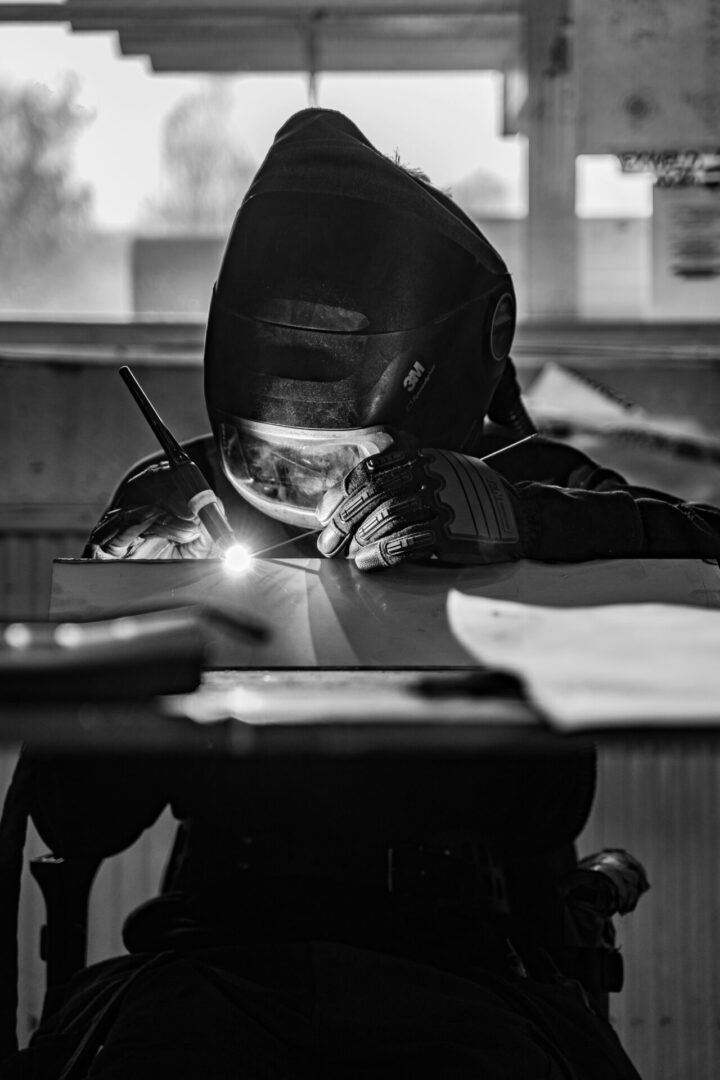Need help? Call us: 028 9046 0541 or info@0d04d28e-72a4-47fa-b9bd-42897efedf67.cc12.conves.io

If you’re looking for precision, cleanliness, and control in your welding applications, TIG in welding is a process that stands out. Whether you’re fabricating stainless steel handrails or working on intricate aluminium components, TIG welding offers unmatched quality and a cleaner finish than most other welding techniques.
But what exactly is TIG welding, how does it work, and what equipment do you need? In this guide, we’ll break it all down and show you where to find the best TIG welders in the UK — right here at Welder’s Choice.
TIG stands for Tungsten Inert Gas welding, also known as GTAW (Gas Tungsten Arc Welding). It’s a manual welding process that uses a non-consumable tungsten electrode to produce the weld. The weld area is shielded from atmospheric contamination by an inert gas, typically argon or a mix of argon and helium.
TIG in welding is highly valued for its ability to produce clean, high-quality welds with excellent bead appearance. It’s ideal for applications that require precise, low-spatter welds — including aerospace, automotive, food-grade stainless fabrication, and pipe welding.
TIG in welding uses an arc between the non-consumable tungsten electrode and the workpiece. The welder may use a filler rod, but it’s not always necessary. The arc and weld area are protected by a stream of inert shielding gas.
In TIG welding, you often need to manually feed the filler rod with one hand while holding the torch in the other — giving you full control but requiring more skill than MIG or Stick welding.
To perform TIG in welding, you’ll need:
At Welder’s Choice, we stock a wide range of TIG welders, torches, and consumables from top brands like Stahlwerk, Miller, and Helvi — all available with fast UK delivery. Browse TIG welders now.
You may be wondering how TIG welding compares to MIG welding. Here’s a quick breakdown:
| Feature | TIG Welding | MIG Welding |
|---|---|---|
| Electrode Type | Non-consumable tungsten | Consumable wire |
| Shielding Gas | Argon or argon/helium | Argon/CO₂ mix |
| Weld Appearance | Very clean, smooth, neat | Less clean, more spatter |
| Skill Level Needed | High | Moderate |
| Ideal For | Thin metals, aluminium, stainless | Thicker metals, mild steel |
| Speed | Slower | Faster |
Verdict: TIG welding is slower but offers better weld quality, especially when detail and appearance matter.
TIG in welding is one of the most versatile welding processes, capable of welding:
Ready to invest in your first TIG machine or upgrade to a better unit? Here are some of our most popular options:
An affordable yet powerful AC/DC TIG welder — ideal for both aluminium and stainless. Includes pulse welding function for thin materials.
Premium DC TIG machine, perfect for stainless and mild steel. Compact, reliable, and built for professional use.
Great for mobile TIG in welding, DC Tig Welding, AC Tig Welding Aluminium , Arc Welding and also MMA/Stick Welding.
If you need clean, precise welds and are working with stainless steel or aluminium, TIG in welding is the way to go. While it takes more time and skill, the results speak for themselves. Whether you’re repairing bike frames, welding pressure pipe, or fabricating stainless tanks, TIG gives you control, beauty, and strength.
Looking to get started or upgrade your setup? At Norsemen Safety, we’ve got you covered.
TIG welding remains the gold standard for clean, strong, and precise welds. While it may not be the fastest process, it’s the preferred method when quality counts.
With the right equipment and some practice, TIG welding can elevate your fabrication skills and open the door to a wider range of jobs — from artistic projects to high-end industrial work.
If you’re in the market for a TIG welder in the UK, check out Welder’s Choice at Norsemen Safety — your go-to source for reliable machines, top brands, and expert advice.

